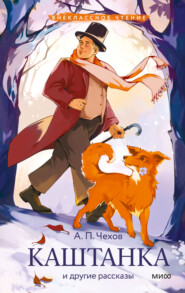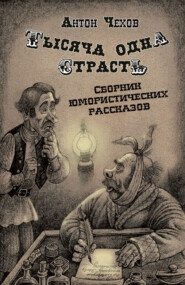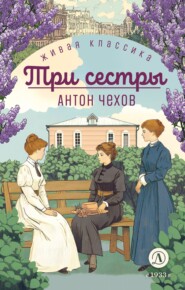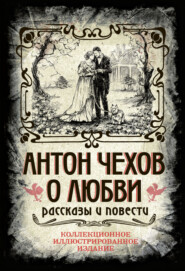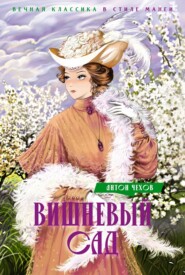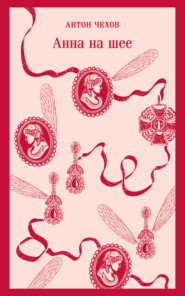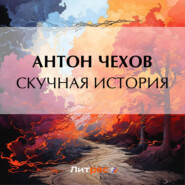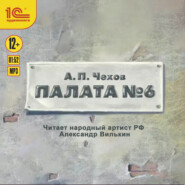По всем вопросам обращайтесь на: info@litportal.ru
(©) 2003-2025.
✖
The Bishop and Other Stories
Настройки чтения
Размер шрифта
Высота строк
Поля
"Stop!" cried Kuzmitchov. "Pull up! Woa!"
Deniska threw his whole body backwards and pulled up the horses.
"Come here!" Kuzmitchov shouted to the shepherd. "Call off the dogs, curse them!"
The old shepherd, tattered and barefoot, wearing a fur cap, with a dirty sack round his loins and a long crook in his hand – a regular figure from the Old Testament – called off the dogs, and taking off his cap, went up to the chaise. Another similar Old Testament figure was standing motionless at the other end of the flock, staring without interest at the travellers.
"Whose sheep are these?" asked Kuzmitchov.
"Varlamov's," the old man answered in a loud voice.
"Varlamov's," repeated the shepherd standing at the other end of the flock.
"Did Varlamov come this way yesterday or not?"
"He did not; his clerk came.."
"Drive on!"
The chaise rolled on and the shepherds, with their angry dogs, were left behind. Yegorushka gazed listlessly at the lilac distance in front, and it began to seem as though the windmill, waving its sails, were getting nearer. It became bigger and bigger, grew quite large, and now he could distinguish clearly its two sails. One sail was old and patched, the other had only lately been made of new wood and glistened in the sun. The chaise drove straight on, while the windmill, for some reason, began retreating to the left. They drove on and on, and the windmill kept moving away to the left, and still did not disappear.
"A fine windmill Boltva has put up for his son," observed Deniska.
"And how is it we don't see his farm?"
"It is that way, beyond the creek."
Boltva's farm, too, soon came into sight, but yet the windmill did not retreat, did not drop behind; it still watched Yegorushka with its shining sail and waved. What a sorcerer!
II
Towards midday the chaise turned off the road to the right; it went on a little way at walking pace and then stopped. Yegorushka heard a soft, very caressing gurgle, and felt a different air breathe on his face with a cool velvety touch. Through a little pipe of hemlock stuck there by some unknown benefactor, water was running in a thin trickle from a low hill, put together by nature of huge monstrous stones. It fell to the ground, and limpid, sparkling gaily in the sun, and softly murmuring as though fancying itself a great tempestuous torrent, flowed swiftly away to the left. Not far from its source the little stream spread itself out into a pool; the burning sunbeams and the parched soil greedily drank it up and sucked away its strength; but a little further on it must have mingled with another rivulet, for a hundred paces away thick reeds showed green and luxuriant along its course, and three snipe flew up from them with a loud cry as the chaise drove by.
The travellers got out to rest by the stream and feed the horses. Kuzmitchov, Father Christopher and Yegorushka sat down on a mat in the narrow strip of shade cast by the chaise and the unharnessed horses. The nice pleasant thought that the heat had imprinted in Father Christopher's brain craved expression after he had had a drink of water and eaten a hard-boiled egg. He bent a friendly look upon Yegorushka, munched, and began:
"I studied too, my boy; from the earliest age God instilled into me good sense and understanding, so that while I was just such a lad as you I was beyond others, a comfort to my parents and preceptors by my good sense. Before I was fifteen I could speak and make verses in Latin, just as in Russian. I was the crosier-bearer to his Holiness Bishop Christopher. After mass one day, as I remember it was the patron saint's day of His Majesty Tsar Alexandr Pavlovitch of blessed memory, he unrobed at the altar, looked kindly at me and asked, 'Puer bone, quam appelaris?' And I answered, 'Christopherus sum;' and he said, 'Ergo connominati sumus' – that is, that we were namesakes.. Then he asked in Latin, 'Whose son are you?' To which I answered, also in Latin, that I was the son of deacon Sireysky of the village of Lebedinskoe. Seeing my readiness and the clearness of my answers, his Holiness blessed me and said, 'Write to your father that I will not forget him, and that I will keep you in view.' The holy priests and fathers who were standing round the altar, hearing our discussion in Latin, were not a little surprised, and everyone expressed his pleasure in praise of me. Before I had moustaches, my boy, I could read Latin, Greek, and French; I knew philosophy, mathematics, secular history, and all the sciences. The Lord gave me a marvellous memory. Sometimes, if I read a thing once or twice, I knew it by heart. My preceptors and patrons were amazed, and so they expected I should make a learned man, a luminary of the Church. I did think of going to Kiev to continue my studies, but my parents did not approve. 'You'll be studying all your life,' said my father; 'when shall we see you finished?' Hearing such words, I gave up study and took a post… Of course, I did not become a learned man, but then I did not disobey my parents; I was a comfort to them in their old age and gave them a creditable funeral. Obedience is more than fasting and prayer.
"I suppose you have forgotten all your learning?" observed Kuzmitchov.
"I should think so! Thank God, I have reached my eightieth year! Something of philosophy and rhetoric I do remember, but languages and mathematics I have quite forgotten."
Father Christopher screwed up his eyes, thought a minute and said in an undertone:
"What is a substance? A creature is a self-existing object, not requiring anything else for its completion."
He shook his head and laughed with feeling.
"Spiritual nourishment!" he said. "Of a truth matter nourishes the flesh and spiritual nourishment the soul!"
"Learning is all very well," sighed Kuzmitchov, "but if we don't overtake Varlamov, learning won't do much for us."
"A man isn't a needle – we shall find him. He must be going his rounds in these parts."
Among the sedge were flying the three snipe they had seen before, and in their plaintive cries there was a note of alarm and vexation at having been driven away from the stream. The horses were steadily munching and snorting. Deniska walked about by them and, trying to appear indifferent to the cucumbers, pies, and eggs that the gentry were eating, he concentrated himself on the gadflies and horseflies that were fastening upon the horses' backs and bellies; he squashed his victims apathetically, emitting a peculiar, fiendishly triumphant, guttural sound, and when he missed them cleared his throat with an air of vexation and looked after every lucky one that escaped death.
"Deniska, where are you? Come and eat," said Kuzmitchov, heaving a deep sigh, a sign that he had had enough.
Deniska diffidently approached the mat and picked out five thick and yellow cucumbers (he did not venture to take the smaller and fresher ones), took two hard-boiled eggs that looked dark and were cracked, then irresolutely, as though afraid he might get a blow on his outstretched hand, touched a pie with his finger.
"Take them, take them," Kuzmitchov urged him on.
Deniska took the pies resolutely, and, moving some distance away, sat down on the grass with his back to the chaise. At once there was such a sound of loud munching that even the horses turned round to look suspiciously at Deniska.
After his meal Kuzmitchov took a sack containing something out of the chaise and said to Yegorushka:
"I am going to sleep, and you mind that no one takes the sack from under my head."
Father Christopher took off his cassock, his girdle, and his full coat, and Yegorushka, looking at him, was dumb with astonishment. He had never imagined that priests wore trousers, and Father Christopher had on real canvas trousers thrust into high boots, and a short striped jacket. Looking at him, Yegorushka thought that in this costume, so unsuitable to his dignified position, he looked with his long hair and beard very much like Robinson Crusoe. After taking off their outer garments Kuzmitchov and Father Christopher lay down in the shade under the chaise, facing one another, and closed their eyes. Deniska, who had finished munching, stretched himself out on his back and also closed his eyes.
"You look out that no one takes away the horses!" he said to
Yegorushka, and at once fell asleep.
Stillness reigned. There was no sound except the munching and snorting of the horses and the snoring of the sleepers; somewhere far away a lapwing wailed, and from time to time there sounded the shrill cries of the three snipe who had flown up to see whether their uninvited visitors had gone away; the rivulet babbled, lisping softly, but all these sounds did not break the stillness, did not stir the stagnation, but, on the contrary, lulled all nature to slumber.
Yegorushka, gasping with the heat, which was particularly oppressive after a meal, ran to the sedge and from there surveyed the country. He saw exactly the same as he had in the morning: the plain, the low hills, the sky, the lilac distance; only the hills stood nearer; and he could not see the windmill, which had been left far behind. From behind the rocky hill from which the stream flowed rose another, smoother and broader; a little hamlet of five or six homesteads clung to it. No people, no trees, no shade were to be seen about the huts; it looked as though the hamlet had expired in the burning air and was dried up. To while away the time Yegorushka caught a grasshopper in the grass, held it in his closed hand to his ear, and spent a long time listening to the creature playing on its instrument. When he was weary of its music he ran after a flock of yellow butterflies who were flying towards the sedge on the watercourse, and found himself again beside the chaise, without noticing how he came there. His uncle and Father Christopher were sound asleep; their sleep would be sure to last two or three hours till the horses had rested… How was he to get through that long time, and where was he to get away from the heat? A hard problem… Mechanically Yegorushka put his lips to the trickle that ran from the waterpipe; there was a chilliness in his mouth and there was the smell of hemlock. He drank at first eagerly, then went on with effort till the sharp cold had run from his mouth all over his body and the water was spilt on his shirt. Then he went up to the chaise and began looking at the sleeping figures. His uncle's face wore, as before, an expression of business-like reserve. Fanatically devoted to his work, Kuzmitchov always, even in his sleep and at church when they were singing, "Like the cherubim," thought about his business and could never forget it for a moment; and now he was probably dreaming about bales of wool, waggons, prices, Varlamov… Father Christopher, now, a soft, frivolous and absurd person, had never all his life been conscious of anything which could, like a boa-constrictor, coil about his soul and hold it tight. In all the numerous enterprises he had undertaken in his day what attracted him was not so much the business itself, but the bustle and the contact with other people involved in every undertaking. Thus, in the present expedition, he was not so much interested in wool, in Varlamov, and in prices, as in the long journey, the conversations on the way, the sleeping under a chaise, and the meals at odd times… And now, judging from his face, he must have been dreaming of Bishop Christopher, of the Latin discussion, of his wife, of puffs and cream and all sorts of things that Kuzmitchov could not possibly dream of.
While Yegorushka was watching their sleeping faces he suddenly heard a soft singing; somewhere at a distance a woman was singing, and it was difficult to tell where and in what direction. The song was subdued, dreary and melancholy, like a dirge, and hardly audible, and seemed to come first from the right, then from the left, then from above, and then from underground, as though an unseen spirit were hovering over the steppe and singing. Yegorushka looked about him, and could not make out where the strange song came from. Then as he listened he began to fancy that the grass was singing; in its song, withered and half-dead, it was without words, but plaintively and passionately, urging that it was not to blame, that the sun was burning it for no fault of its own; it urged that it ardently longed to live, that it was young and might have been beautiful but for the heat and the drought; it was guiltless, but yet it prayed forgiveness and protested that it was in anguish, sad and sorry for itself..
Yegorushka listened for a little, and it began to seem as though this dreary, mournful song made the air hotter, more suffocating and more stagnant… To drown the singing he ran to the sedge, humming to himself and trying to make a noise with his feet. From there he looked about in all directions and found out who was singing. Near the furthest hut in the hamlet stood a peasant woman in a short petticoat, with long thin legs like a heron. She was sowing something. A white dust floated languidly from her sieve down the hillock. Now it was evident that she was singing. A couple of yards from her a little bare-headed boy in nothing but a smock was standing motionless. As though fascinated by the song, he stood stock-still, staring away into the distance, probably at Yegorushka's crimson shirt.
The song ceased. Yegorushka sauntered back to the chaise, and to while away the time went again to the trickle of water.
And again there was the sound of the dreary song. It was the same long-legged peasant woman in the hamlet over the hill. Yegorushka's boredom came back again. He left the pipe and looked upwards. What he saw was so unexpected that he was a little frightened. Just above his head on one of the big clumsy stones stood a chubby little boy, wearing nothing but a shirt, with a prominent stomach and thin legs, the same boy who had been standing before by the peasant woman. He was gazing with open mouth and unblinking eyes at Yegorushka's crimson shirt and at the chaise, with a look of blank astonishment and even fear, as though he saw before him creatures of another world. The red colour of the shirt charmed and allured him. But the chaise and the men sleeping under it excited his curiosity; perhaps he had not noticed how the agreeable red colour and curiosity had attracted him down from the hamlet, and now probably he was surprised at his own boldness. For a long while Yegorushka stared at him, and he at Yegorushka. Both were silent and conscious of some awkwardness. After a long silence Yegorushka asked:
"What's your name?"
The stranger's cheeks puffed out more than ever; he pressed his back against the rock, opened his eyes wide, moved his lips, and answered in a husky bass: "Tit!"
The boys said not another word to each other; after a brief silence, still keeping his eyes fixed on Yegorushka, the mysterious Tit kicked up one leg, felt with his heel for a niche and clambered up the rock; from that point he ascended to the next rock, staggering backwards and looking intently at Yegorushka, as though afraid he might hit him from behind, and so made his way upwards till he disappeared altogether behind the crest of the hill.
After watching him out of sight, Yegorushka put his arms round his knees and leaned his head on them… The burning sun scorched the back of his head, his neck, and his spine. The melancholy song died away, then floated again on the stagnant stifling air. The rivulet gurgled monotonously, the horses munched, and time dragged on endlessly, as though it, too, were stagnant and had come to a standstill. It seemed as though a hundred years had passed since the morning. Could it be that God's world, the chaise and the horses would come to a standstill in that air, and, like the hills, turn to stone and remain for ever in one spot? Yegorushka raised his head, and with smarting eyes looked before him; the lilac distance, which till then had been motionless, began heaving, and with the sky floated away into the distance… It drew after it the brown grass, the sedge, and with extraordinary swiftness Yegorushka floated after the flying distance. Some force noiselessly drew him onwards, and the heat and the wearisome song flew after in pursuit. Yegorushka bent his head and shut his eyes..
Deniska was the first to wake up. Something must have bitten him, for he jumped up, quickly scratched his shoulder and said:
"Plague take you, cursed idolater!"
Then he went to the brook, had a drink and slowly washed. His splashing and puffing roused Yegorushka from his lethargy. The boy looked at his wet face with drops of water and big freckles which made it look like marble, and asked:






